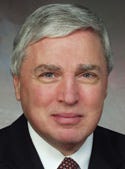The ombudsman resolved an astounding number of complaints and disputes. It helped that most of them were less complex than usual.
October 1, 2007
WASHINGTON WRAP-UP
|
CDRH ombudsman Les Weinstein resolved a whopping 81% of the complaints, disputes, and other contacts he received in 2006, including cases that were carried over from previous years, according to his latest annual report. In 2005, he reported only a 41% resolution rate, which improved upon 2004's 31%.
Weinstein attributes the improvement to a cluster of cases that were faster to resolve and others that were less complex than usual. Coincidentally, a number of carryover cases from prior years also came to resolution in 2006, he says.
|
Les Weinstein almost doubled his resolution rate in 2006. |
His report, which can be accessed at www.fda.gov/cdrh/ombudsman/annual/ombudar2006.html, shows that 78% of contacts came from industry, 9% from consumers, and 3% from healthcare providers. (The other 10% is labeled as “miscellaneous.”) Most of the contacts involved the Office of Device Evaluation (45%), the Office of Compliance (21%), or the Office of Communication, Education, and Radiation Programs (12%). The vast majority of cases (29%) related to 510(k)s, with no other topic involved in more than 7% of contacts.
As in the preceding year, Weinstein says, miscommunication or lack of communication was the leading reason for complaints and disputes in 2006. In second place in both years was “data, testing requirements to support a submission; least burdensome.” Claims of unequal treatment came in third, up from sixth place the previous year.
The report says the ombudsman received three requests for scientific dispute review by the Medical Device Dispute Resolution Panel in 2006. The panel heard the first two disputes December 15, 2006 and April 19, 2007, respectively. The third request was denied.
Weinstein's office wasn't able to do much in significant disputes such as those involving Utah Medical Products and TMJ Implants. However, there's a possible explanation for that. FDA's rules make certain cases off-limits to the ombudsman when enforcement has begun or litigation is looming. Should the agency reconsider those rules in the interest of conserving taxpayer legal expenses?
Commissioner Defends Staff Bonuses
|
Von Eschenbach said the bonuses help FDA retain experts. |
A summer storm erupted in Washington political circles over the Washington Post's disclosure that senior FDA managers had received large bonuses in 2006—when the agency was supposed to be tightening its belt and spending every cent on import surveillance.
Three CDRH managers received notable bonuses: Deputy CDRH Director Linda Kahan ($34,000), Compliance Director Tim Ulatowski ($21,000), and Senior Associate Center Director Lillian Gill ($20,000). But those paled in comparison to higher-ups in the Center for Drug Evaluation and Research and the Commissioner's Office, whose bonuses were as high as $47,000 for a grand total of $13 million.
In a rare move, FDA commissioner Andrew von Eschenbach spoke publicly about the matter. In a letter to the Washington Post, he wrote that contrary to its report, more than 90% of the $13 million retention bonus pool went directly to the agency's physicians and scientists. “Members of the Senior Executive Service and other managers received 9% of that bonus pool,” he wrote.
Von Eschenbach chided the Post for having “mischaracterized the many contributions of two senior executives who received bonuses. [Associate Commissioner for Regulatory Affairs] Margaret Glavin effectively oversees FDA's nationwide field operation of 3200 employees as our first line of public health defense. She established FDA's Office of Counterterrorism Policy and Planning and has received two Presidential Rank awards.
“[Office of Criminal Investigations Director] Terry Vermillion, also a recipient of the Presidential Rank Award, founded FDA's Office of Criminal Investigations and has led more than 4600 national and international criminal investigations, resulting in 4338 arrests, more than 3100 convictions, more than $2.15 billion in fines and $750 million in assets forfeited to the Justice Department.
“Responsible use of pay flexibilities helps FDA find and keep expert, dedicated employees—and [this practice] has proven essential to our ability to fulfill our public health mission.”
His avowals of bonus award purity of purpose didn't sway some skeptics. One commented on my Web site: “You get extra money for doing the job you were hired to do? I guess this is like the tip jar you see at Starbucks. Now I understand.”
Meanwhile, the Government Accountability Office is investigating the use of such bonuses by executive-branch agencies.
FDA Warns STERIS Over MDRs
A June 2006 inspection at STERIS Corp.'s Montgomery, AL, facility found medical device reporting (MDR) violations in the manufacture of STERIS Armsco sonic energy cleaners. A recently released warning letter from FDA's New Orleans district office said violations included failure to submit MDRs to FDA for 16 separate units. FDA also cited the company for failure to submit a written report to FDA after initiating a correction to the sonic energy cleaners in response to complaints of fires associated with the units.
The company was told to submit a written response detailing specific steps taken to correct the violations, including an explanation of how the company will prevent these and similar violations from occurring again.
NuMed Guilty, Fined $4.5 Million
NuMed Inc. (Hopkinton, NY) and its founder and president, Allen Tower, have pleaded guilty in Wilmington, DE, federal court to four misdemeanor charges. They have been sentenced to pay $4.5 million in fines, with half the money going to a clinical trial. Federal officials said the plea agreement ends a three-year probe into allegations that NuMed sold unapproved medical devices to doctors treating children with heart problems. The issue first surfaced when doctors at A.I. DuPont Hospital for Children in Delaware raised questions about NuMed's Cheatham-Platinum stents and balloon-in-balloon catheters.
Prosecutors said NuMed and Tower provided the devices to doctors despite explicit written warnings from FDA. Tower told the court he simply could not deny the devices to doctors in need.
In 2004, two DuPont Hospital physicians and an administrator were fired and several civil lawsuits were filed after parents said they were not properly informed that devices being used to treat their children were not FDA-approved. Government prosecutors believed that a felony charge and conviction would not benefit the public because it would probably force NuMed to close, making a number of medical devices the company manufactures unavailable. They said NuMed is the only provider of a number of pediatric products and no other manufacturer is likely to take its place.
Federal district judge Joseph Farnan said he had received hundreds of letters from doctors around the world praising Tower and his work. Prosecutors said FDA had no evidence that the unapproved devices resulted in any deaths, and Farnan said the letters he received indicated that NuMed's devices saved lives.
Still, U.S. Attorney Colm Connolly told local media that while Tower had done a great deal of good, FDA rules are in place to protect public safety and there has to be a clear sanction for those who ignore the regulations. “This was not a mistake,” Connolly said. Prosecutors pointed out that Tower was advised by one of his own employees not to ship the devices.
Half the $4.5 million fine is to be paid directly to Johns Hopkins University to fund a clinical trial for the Cheatham-Platinum stent. NuMed also received three years of probation. It will have to provide the devices for the Hopkins clinical trial free of charge and cannot take a tax break for participating in it. Also, if FDA ultimately approves the device, the company has agreed to provide it at no cost for five years to any U.S. healthcare provider in the country who requests one.
APL Diagnostics Gets FDA Warning
Officials of Louisville APL Diagnostics Inc. (Seabrook, TX) failed to consult with FDA District Office recall coordinators for product recalls initiated in July 2006, October 2005, and October 2004, according to a recently released warning letter from FDA's Dallas district office. The firm manufactures the semiquantitative enzyme-linked immunosorben assay (ELISA) kits that are used in the diagnosis of antiphospholipid syndrome in patients presenting with thrombosis or thrombocytopenia.
The warning letter said an April 14–May 18 inspection also found that the facility does not conform to current good manufacturing practice requirements of the quality system regulation. Violations cited included:
Failure to establish and maintain adequate procedures to control labeling and packaging activities to prevent labeling mix-ups.
Failure to inspect product labeling for accuracy including, where applicable, the correct expiration date, control number, storage instructions, handling instructions, and any additional processing instructions.
Failure to ensure that all equipment used in the manufacturing process meets specified requirements.
Failure to establish and maintain procedures for identifying, documenting, validating, or verifying review and approval of design changes before they are implemented.
Failure to establish and maintain adequate procedures for validating the device design to ensure that design risk analysis is conducted and documented, that the device conforms to user needs and intended uses, that acceptance criteria are established before performing validation activities, that design testing is conducted under actual or simulated use conditions, and that design testing results are documented.
Failure to establish and maintain a device history file for each type of device to include or reference the records necessary to demonstrate that the design was developed in accordance with the approved design plan and the design control requirements.
Failure to establish and maintain procedures to ensure that the device history records for each batch, lot, or unit are maintained to demonstrate that the device is manufactured in accordance with the device master record.
The warning letter also documented corrections and removals violations such as failure to maintain records of justification for not reporting a correction or removal action to FDA. In addition, the company was cited for failure to promptly report to FDA any correction or removal of a device to reduce a health risk within 10 working days.
Company officials verbally promised corrections but have not responded in writing to the FDA-483 observations left at the end of the inspection, the letter said. The company was told to submit a written response to address all specific items cited in the warning letter and the FDA-483 observations and provide a timeframe for correcting them.
Baxter Colleague Recall is Widened
Baxter Healthcare Corp. (Deerfield, IL) is recalling additional 986 Colleague infusion pumps due to falsified electrical safety data. The company's July 25 recall initially covered 534 infusion pumps serviced in the company's Phoenix service center.
The company says the recall was expanded to cover all pumps serviced by three employees who have since been fired for falsifying repair, test, and inspection data sheets, including electrical safety data for Colleague and Flo-Gard infusion pumps. Because service documentation data were falsified, the company says, it is possible that pumps sent to be serviced, repaired, or corrected were returned without proper service.
FDA has classified the recall as Class 1 due to the potential risk of serious injury or patient death if an affected device malfunctions. The company says a defect may result in overinfusion, underinfusion, failure to detect an upstream or downstream occlusion, electrical shock hazard, failure to detect air in line, and malfunctions in which the pump stops infusing.
Pulse Biomedical Gets Warning from FDA
According to a recent FDA warning letter, an agency inspection at Pulse Biomedical Inc. (Norristown, PA) last February found quality system violations in the firm's manufacture of the QRS-Card electrocardiograph machine with Bluetooth interface technology. The July 30 warning letter from FDA's Philadelphia district office says the company's March 5 response to FDA-483 observations was not adequate.
The warning letter also noted that the company never obtained marketing clearance or approval for its product. The firm's 510(k) did not include the use of Bluetooth technology, which FDA says is a significant change to a device—necessitating a new 510(k).
Pulse was told to notify the district office within 15 working days of steps taken to correct the violations, with an explanation of how the company plans to prevent these or similar violations from occurring again.
Pulse's violations
Pulse was told to take prompt action to correct the violations addressed in the letter and cautioned that failure to correct them could result in regulatory action being taken without further notice. Those observations included:
Failure to establish and maintain adequate procedures for identifying, documenting, validating, or, where appropriate, verifying, reviewing, and approving design changes before their implementation.
Failure to establish and maintain procedures for receiving, reviewing, and evaluating complaints by a formally designated unit.
Failure to establish and maintain documented instructions, standard operating procedures, and methods that define and control the manner of production.
Failure to document approval and distribution of documents and procedures.
Failure to maintain, or refer to the location of, device specifications including appropriate drawings, composition, formulation, component specifications, and software specifications.
Staar Surgical Cited by FDA Over Study
A February 15–March 14 inspection at Staar Surgical Co. (Monrovia, CA) found violations of regulations governing the protection of human subjects in a clinical study. The study, “Clinical Study Protocol—Staar Surgical Implantable Toric Phakic ICL for Myopic/Astigmatic Patients,” was performed under an investigational device exemption (IDE) and in support of premarket approval. A recently released warning letter says violations noted on the FDA-483 included:
Failure to submit an IDE application to FDA, ensure institutional review board approval is obtained, and ensure FDA approval of an IDE application before beginning the investigation.
Failure to secure the investigators' compliance with the investigational plan and applicable FDA regulations.
Failure to immediately conduct an evaluation of all unexpected adverse device effects.
Failure to submit required reports and information to FDA for an investigation being conducted under an IDE, including reports of prior investigations.
The company was given 15 days to provide written documentation of actions that have been or will be taken to correct the violations and prevent recurrence of similar ones.
FDA Guidance on Recombinant DNA Sutures
FDA has issued a guidance for industry and FDA staff to support classification of the sutures into Class II. The guidance, titled Class II Special Controls Guidance Document: Absorbable Poly(hydroxybutyrate) Surgical Suture Produced by Recombinant DNA Technology, says the device is an absorbable poly(hydroxybutyrate) surgical suture made of material isolated from prokaryotic cells produced by recombinant DNA technology. It is intended for use in general soft-tissue approximation and ligation.
The guidance covers device description, risks to health, biocompatibility, sterility, physical and performance characteristics, expiration dating, clinical studies, labeling, and manufacturing. The document is available at http://www.fda.gov/OHRMS/DOCKETS/98fr/07d-0268-gdl0001.pdf.
Health Risks of Recombinant DNA Sutures
The guidance says FDA has identified potential health risks with the sutures and recommends specific mitigation measures including: improper selection and use (physical and performance characteristics, biocompatibility, and labeling); suture breakage (physical and performance characteristics and expiration dating); adverse tissue reaction (biocompatibility); and infection (sterility).
Sunrise Recalls Wheelchairs
Sunrise Medical (Fresno, CA) is recalling three models of its Quickie Power wheelchairs because the display rotates around its mount and may result in the wire coming out of the casing. An FDA Class 2 recall notice says the wire may short circuit, resulting in a spark, smoke, or flame. There is also a chance that material close to the wiring may catch fire.
The company contacted customers by phone and mailed notification letters in May. Consumers were advised to contact their wheelchair vendors regarding installation of an upgrade kit.
FDA Guidance on Postapproval PMA Studies
CDRH has issued a guidance for industry and FDA staff: Procedures for Handling Post-Approval Studies Imposed by PMA Order. It provides recommendations on expectations concerning format, content, and review of reports related to studies required as a condition of premarket approval. The guidance is intended to help ensure that studies are conducted effectively and efficiently, and in the least burdensome manner.
Although some postapproval studies may involve animal and laboratory bench studies, the guidance says its recommendations focus on clinical postapproval studies. The guidance may be accessed at http://www.fda.gov/cdrh/osb/guidance/1561.pdf.
Improving Studies
The recommendations are expected to improve postapproval studies by:
Helping CDRH and sponsors ensure consistency in postapproval submissions.
Helping all stakeholders easily and quickly identify and track postapproval studies.
Enhancing sponsor and CDRH discussions on mutually understood study objectives.
Facilitating timely discourse on study issues and challenges.
Providing opportunities to resolve issues.
FDA: Web Site Promoted Off-Label Device Uses
CDRH's Office of Compliance says a Web site for Eidam Diagnostics Corp. (Richmond, BC, Canada) promoting the company's CRT 2000 thermographic system goes beyond the scope of the device's cleared indications. It claims uses in diagnosis, screening, detection, preclinical detection, therapy planning, and therapy monitoring of a wide range of diseases and conditions.
A July 26 warning letter says the devices have a cleared 510(k) for adjunctive use and do not have clearance for comparison of the device output with a library of historical data. The warning letter also says that the Web site claims refer to FDA approval of the products. “Although FDA cleared a 510(k) for your product for adjunctive detection of temperature changes, FDA has not approved a premarket approval application for your product,” the letter says. “Marketing your products for these intended uses is a violation of the law.” The letter describes several ways in which FDA considers the products to be legally adulterated and misbranded.
The company was told to immediately stop disseminating promotional materials for the CRT 2000 that are the same or similar to those outlined in the warning letter. It must also submit a written response describing its plan to comply with the request and discontinue using such materials.
Copyright ©2007 Medical Device & Diagnostic Industry
About the Author(s)
You May Also Like





